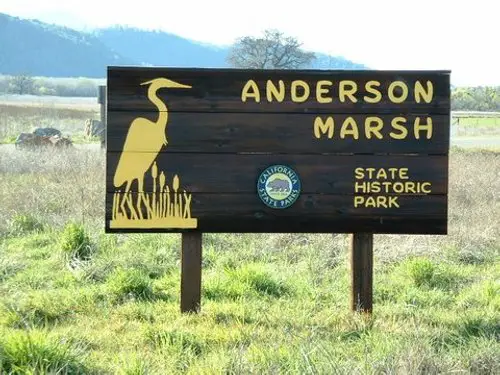
LOWER LAKE, Calif. – Thanks to a new law, state parks slated for closure – including Lake County's own Anderson Marsh – could be spared through cooperative agreements with nonprofits.
On Oct. 4, Gov. Jerry Brown signed AB 42 by Assemblyman Jared Huffman (D-San Rafael).
According to a report from Huffman's office, AB 42 authorizes the California Department of Parks and Recreation to enter into operating agreements with qualified nonprofit organizations to operate a state park unit if the agreement will enable the state to keep open a state park that would otherwise be closed.
In a statement, Huffman said his bill represents “a creative solution” to allow some parks to remain open despite the state's budget challenges.
“Particularly in these tough economic times, creative public/private partnerships are an essential tool in providing ongoing protection of, and continued access to, these treasured public assets,” said Huffman. “As we struggle to address California’s state budget deficit, I will continue to work to protect funding for state parks.”
The bill also has the support of the California State Parks Foundation, which said state parks are more at risk now than ever before.
“By signing AB 42, Gov. Brown has recognized that nonprofit organizations are essential partners to our state parks, particularly as 70 parks are set to close,” said Elizabeth Goldstein, president of the California State Parks Foundation.
In 2008, 2009 and again this year, Anderson Marsh State Historic Park was included on a list of parks proposed for closure due to budget cuts.
But with AB 42 now law, the Anderson Marsh Interpretive Association may be able to move forward with an agreement with the state to keep the park open.
The 1,000-acre park – which contains Pomo archaeological sites estimated to be at least 10,000 years old as well as a 19th century ranch house and barn complex – was acquired by the state in 1982. Two years later, AMIA formed to support it, according to a history of the group on its Web site, www.andersonmarsh.org/.
The group of volunteers organizes walks and outdoor education events at the park, puts on an annual Christmas event and for the last six years has hosted the Old Time Bluegrass Festival, with the park as its backdrop. AMIA's fundraisers also support conservation and facilities rehabilitation projects at the park.
Volunteers have continued to urge the state to keep the park open despite its appearance on the closure lists, and they're willing to step up and make a bigger commitment to keep it accessible to the public, said Henry Bornstein, AMIA treasurer and board member.
“We are definitely very interested in keeping the park open by funding some sort of agreement with the state,” said Bornstein. “We've been talking with the state and they are very interested in doing that also.”
The exploration of such an agreement already had begun before AB 42 became law, according to Bornstein, but they had to wait for the governor's signature to move forward.
Bornstein said there are two possible scenarios – a full or partial operating agreement between AMIA and the state, or a comanagement agreement in which the state and the group each would have certain responsibilities.
“They all amount to the same thing, which is that AMIA would go to the local community, which has been very supportive, to see if people want to get together with us and keep the park open,” he said.
AMIA is meeting this month with the sector and district park superintendents to begin formal negotiations, Bornstein said.
The park isn't huge, and it doesn't have big bills, said Bornstein.
He estimated that the park annually costs as much as $12,000 a year to operate. “Because of that we think this is really doable. It's within our range to do it.”
It's a realistic goal, especially considering that Bornstein said the bluegrass festival, AMIA's main fundraiser, raised $7,000 last year. “That's significant funding.”
Referring to a statement by State Parks Director Ruth Coleman, Bornstein said the new model for running parks involves thinking outside of the box.
Bornstein said AMIA is looking at partnering with local agencies, service groups and businesses to secure all the needed funding to keep the park operating at its current level.
“There's a lot of interest,” he said.
If AMIA reaches an agreement with the state, Bornstein said a public meeting would take place to kick off the group's effort to help operate the park.
Bornstein said Anderson Marsh went into a seasonal closure on Sept. 12, but AMIA plans to continue offering nature walks in October and November.
E-mail Elizabeth Larson at

 How to resolve AdBlock issue?
How to resolve AdBlock issue? 



